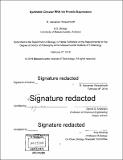Synthetic circular RNA for protein expression
Author(s)
Wesselhoeft, R. Alexander(Robert Alexander)
Download1123218153-MIT.pdf (14.85Mb)
Other Contributors
Massachusetts Institute of Technology. Department of Biology.
Advisor
Daniel G. Anderson.
Terms of use
Metadata
Show full item recordAbstract
Messenger RNA (mRNA) has broad potential for therapeutic and engineering applications. One fundamental limitation of mRNA is its relatively short half-life in biological systems, effected in part by rapid exonuclease-mediated degradation upon delivery. Circular RNA (circRNA), a type of single-stranded RNA with a contiguous structure that lacks the end motifs necessary for exonuclease recognition, may be resistant to this mechanism of degradation and therefore may exhibit superior stability. However, challenges in circularization, purification, and protein expression have impeded a thorough investigation of exogenous circRNA. By rationally designing ubiquitous accessory sequences to facilitate circularization, we engineered a permuted self-splicing intron that efficiently circularized RNAs up to 5kb in length in vitro. With the addition of these accessory sequences, we were able to demonstrate nearly complete circularization of precursor RNAs containing an internal ribosome entry site (IRES) for translation initiation and a coding region such as erythropoietin or eGFP. We found that translation from optimized circRNA was robust, and circRNA protein expression stability far exceeded that of both unmodified and nucleoside modified linear mRNA in some cellular contexts. We monitored cytokine release and antiviral defense induction in sensitive cells transfected with circRNA purified by different methods and found that the immunogenicity and stability of circRNA preparations was dependent on the degree of purity, with small amounts of contaminating linear RNA leading to robust cellular immune responses. In contrast to purified unmodified linear mRNA, purified unmodified circRNA was invisible to several RNA sensors including RIG-i and endosomai toil-like receptors (TLRs) and did not provoke a significant cytokine response upon transfection. Using purified circRNA, we finally provided the first demonstration to our knowledge of exogenous circRNA delivery and translation in vivo, and showed that the duration of circRNA translation was extended in adipose tissue in comparison to unmodified and uridine-modified linear mRNAs. In total, this work suggests that circRNA is a promising alternative to linear mRNA for therapeutic applications.
Description
Thesis: Ph. D., Massachusetts Institute of Technology, Department of Biology, 2019 Cataloged from PDF version of thesis. Includes bibliographical references (pages 111-126).
Date issued
2019Department
Massachusetts Institute of Technology. Department of BiologyPublisher
Massachusetts Institute of Technology
Keywords
Biology.